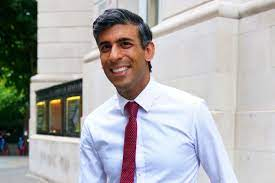Seven weeks after being defeated in his first bid to lead Britain, former Treasury chief Rishi Sunak is set to replace Liz Truss as prime minister and make history as the first person of color in the role.
Sunak, 42, emerged victorious Monday in a lightning-fast contest by the ruling Conservatives to select a new party leader and, by extension, the U.K.'s new prime minister. The process began after Truss resigned Thursday as the shortest-serving premier in the nation's history, following a turbulent tenure that roiled the markets and sparked chaos among the Conservative parliamentary rank and file.
In a dizzying turnaround of political fortune, Sunak was the only leadership candidate to receive the minimum 100 signatures required from fellow Conservative lawmakers by a Monday afternoon deadline. Rival Penny Mordaunt failed to secure enough backers, and former Prime Minister Boris Johnson pulled out of the running late Sunday.
Sunak will become Britain's third prime minister in less than two months, following the resignations of Truss and Johnson. Of Indian descent, Sunak will be the first nonwhite leader of Britain, which, by contrast, has already had three female prime ministers.
It is a remarkably fast rise to the top of British politics for a man who spent most of his adult life working in finance, at Goldman Sachs and hedge firms. Sunak will take up the premiership with relatively little experience in the upper echelons of government, though he had to learn quickly as Johnson's chancellor of the Exchequer, or Treasury chief, during the pandemic, when he oversaw a popular program that kept paychecks flowing to Britons during lockdowns.
Like his predecessors, Truss and Johnson, who resigned in July under the weight of unrelenting scandals, Sunak will have monumental tasks ahead of him in a struggling Britain.
Inflation is at its highest in 40 years as the nation stares out at a dark winter of soaring energy costs. The pound has hovered close to parity with the dollar, an effect of the tax-slashing policies of Truss that sent markets tumbling and caused her downfall. Sunak, at least, can claim better economic sense after having warned during their summer leadership contest that Truss' tax plans were a "fairy tale" whose numbers would not "add up" because they cut billions from the government's budget without making up for the losses.
But he, too, will have to deal with breakaway sentiment in Scotland that could flare once more and the long-term economic and cultural ramifications of Brexit, which have yet to become fully apparent since the move took effect in 2020.
"What we've seen recently is not normal — it's chaos," said Rod Dacombe, director of the Center for British Government at King's College London. "Sunak is going to have some very difficult choices to make. He will have to present himself as an economically steady hand at the same time that the U.K. economy is in dire straits, with the looming prospect of a general election in the background."
Sunak also faces a party in disarray. The Conservatives have a strong majority of seats in the House of Commons but have been torn by infighting over their party's direction. A general election is not expected until January 2025, but polls have shown that if one were held now, the Conservatives would be wiped out by the opposition Labor Party.
"Sunak's biggest challenge is going to be reassuring people that the government is on their side and actually looking after them," said Darren Lilleker, a professor of political communication at Bournemouth University. "Then there is rebuilding the economy and reassuring the markets and rebuilding trust in the party. Those are each quite challenging in their own right."
Sunak has strong conservative credentials. He supported Brexit — which was fueled by anti-immigrant sentiment — and has joined Britain's culture wars by railing against “woke nonsense” that he says is "permeating public life." He supports a controversial government policy to deport asylum seekers to Rwanda for processing.
Sunak will make history at 10 Downing St. not only for his ethnicity. A Hindu who has spoken frequently and fondly about his religious traditions, he will be Britain's first non-Christian prime minister. His victory in the leadership contest Monday came on the same day as the important Hindu holiday of Diwali.
In a nation of 63 million that is 87% white, Asians like Sunak are the biggest ethnic minority, at 7%. Most have roots in India, Pakistan and Bangladesh, which were part of British-ruled India until 1947.
Sunak grew up in the English port city of Southampton to immigrant parents who were born in East Africa, but has close personal ties to the subcontinent. He is married to Akshata Murthy, the daughter of an Indian tech billionaire. Sunak, whose worth is in the hundreds of millions of dollars, will be the wealthiest British prime minister in modern history. He was educated at Oxford and Stanford universities.
In a nation where a cost-of-living crisis has threatened to push hundreds of thousands of people into poverty over the coming months, critics say that Sunak's wealth and privileged upbringing put him out of touch with ordinary Britons. When he campaigned against Truss over the summer, a video clip of a college-age Sunak saying he has no "working-class friends" went viral.
Still, Sunder Katwala, director of British Future, said Sunak's win was a "historic achievement" for his Indian heritage alone.
"This simply would not have been possible even a decade or two ago," said Katwala, whose think tank researches views on race, identity and immigration.
"The British public will judge Rishi Sunak on whether he can get a grip on the chaos in Westminster, sort out the public finances and restore integrity to politics. But we should not underestimate this important social change," Katwala said.

